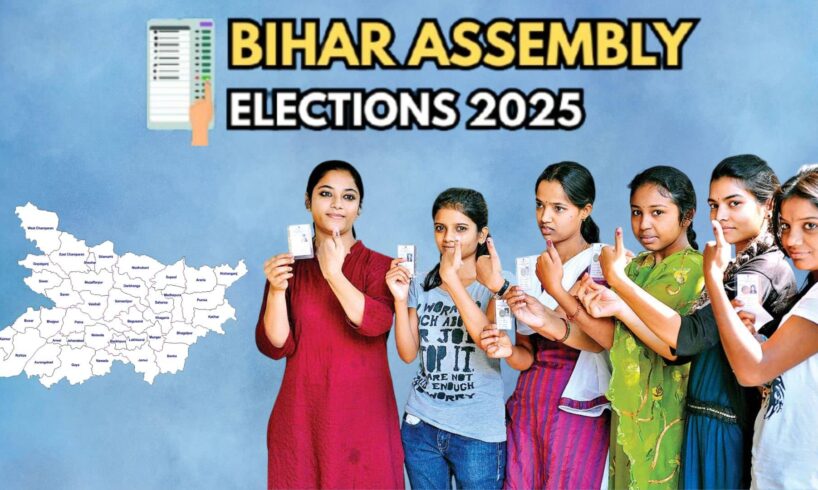
Bihar Assembly Elections 2025: On a dusty afternoon in a village in Bihar’s Samastipur district, 18-year-old Varsha Kumari walks briskly towards her home holding her books and notebooks close to her chest, with a dream in her eyes. As she walks past her village school, which teaches only up to Class 7, she laments the lack of a senior secondary school in her village. Varsha wants to go for higher studies, a privilege not available to girls in her village. This will be her first election as a voter, and she already knows exactly what she wants from the next MLA: A good college, a job for which she doesn’t have to migrate, and one promise — that her dreams won’t be traded for a wedding card.
“This is the first time I will vote,” Varsha says, adjusting the edge of her dupatta over her shoulder as she stands in front of the damaged school boundary wall. “But what am I voting for? There is no school beyond Class 7 in my village, so I have to travel almost 16 kilometres every day to complete my senior secondary education. There is no teacher for science in our local school, no good college nearby, and not even a proper girls’ toilet here. After Class 10, most of my friends either dropped out or got married.”
In Rampura village, where Varsha lives, that trade-off is not just symbolic, it’s routine. As the girls enter their 18th year, the next big decision is not about a suitable course they will take up in college, but about how to find a suitable groom.
Add Zee News as a Preferred Source
“I don’t want to get married just because I turned 18,” says Neha Kumari, a fellow first-time voter and the daughter of a local farmer. “Most girls here don’t make it past 10th. Then it’s either a marriage proposal or they just stop going,” says Neha, adding, “I want to become a teacher. But can’t? My parents say there is no point in spending on my studies when there is no college nearby. If politicians want our vote, they should give us one reason to stay in school.”
Also Read: Bihar Manthan: What’s Brewing On State’s Political Streets Ahead Of November Polls
Rampura is not alone. This struggle echoes across Bihar’s villages, where the vote is often the only voice girls get before decisions are made for them, about school, work, and marriage.
According to the National Family Health Survey-5 (2019–21), female literacy in Bihar stands at 61.1 percent, a steady rise from 56.9 percent recorded in the previous NFHS round. However, only 28.8 percent of women in the state have completed more than ten years of schooling, underscoring the sharp drop-off in education access beyond the secondary level. This is further reflected in attendance data, which shows that while 89 percent of girls aged 6 to 14 are in school, this number falls to just 69 percent for girls aged 15 to 17, a critical age group when most are pushed out of education, either due to lack of institutions, early marriage, or domestic responsibilities.
However, for first-time voters like Varsha, this election is not just about choosing a leader; it’s about being seen, being heard, and being counted. And for the young women of Rampura, their demands are direct: build a college, make higher education a basic mandate, create local jobs, and stop treating girls like a burden.
Rampura may be small, but it reflects a wider truth across Bihar — a generation of young women is demanding more than promises. They are demanding freedom, education, and dignity, and for the first time, they have a vote in their hands.
“We hear slogans like Beti Bachao, Beti Padhao, but after Class 10, there’s nothing to ‘padhao’ us with. No one is talking about beti padhao aur aage badhao,” Varsha says, half-smiling. “All I want is one thing — let me choose my future, not just my husband. Shaadi can wait. Right now, I want a scooter, a college, and a job.”
Also Read: Unemployment, Migration, And Jumlas: Will Youth Push Bihar’s Mandate Beyond Caste?
The challenge of early marriage continues to be deeply entrenched. 40.8 percent of girls in Bihar are married before the age of 18, placing the state among those with the highest rates of child marriage in India. For girls in villages like Rampura, this means that turning 18 often marks the start of marriage negotiations, not entry into college or the workforce.
“I have seen girls with real talent leave school because there’s just no support,” says Savitri Devi, a teacher at the village school. “We need a school till 12th and a good college with all the facilities here. Otherwise, even if girls vote, they have no way to build the future they are voting for.”
An interesting fact that stands out is that despite these structural challenges, women in Bihar have been consistently outpacing men in voter turnout. In the 2020 Bihar Assembly elections, female voter turnout was recorded at 59.7 percent, higher than the male turnout of 54.6 percent, according to the Election Commission of India. This trend has continued since the 2015 elections, where women also voted in larger numbers than men. The overall voter turnout in 2020 was 57.05 percent.
Also Read: Will Rahul Gandhi’s Voter Adhikar Yatra Help Congress End Its Dry Run In Bihar Assembly Polls?
This year, nearly a million girls in Bihar will vote for the first time, many from villages like Rampura. And while they may not be headline-makers or crowd-pullers, their ballot is a quiet revolution. In places where the future is usually decided for them, these young women are finally deciding for themselves.
The 35% Job Reservation Paradox
The Bihar government mandated 35% job reservation for women in state government jobs in 2016, a progressive move aimed at empowering women economically. But in villages like Rampura, where most girls drop out after Class 10 and access to higher education is minimal, the policy raises a crucial question: How will girls claim these reserved jobs if they’re not even able to complete their education?
Without nearby colleges, qualified teachers, or basic infrastructure like girls’ toilets, the gap between policy and possibility remains wide. Reservation on paper means little unless it is backed by real investment in education. As Savitri Devi, the local school teacher, puts it, “What’s the use of a seat in a government office if our girls can’t even get a seat in a classroom?”
The question now is not whether Bihar’s girls are ready for democracy. The question is: Is democracy ready for them?
Also Read: Can Tejashwi Yadav’s Strategy Make Him A Face Of Resurgent Opposition In Bihar?





